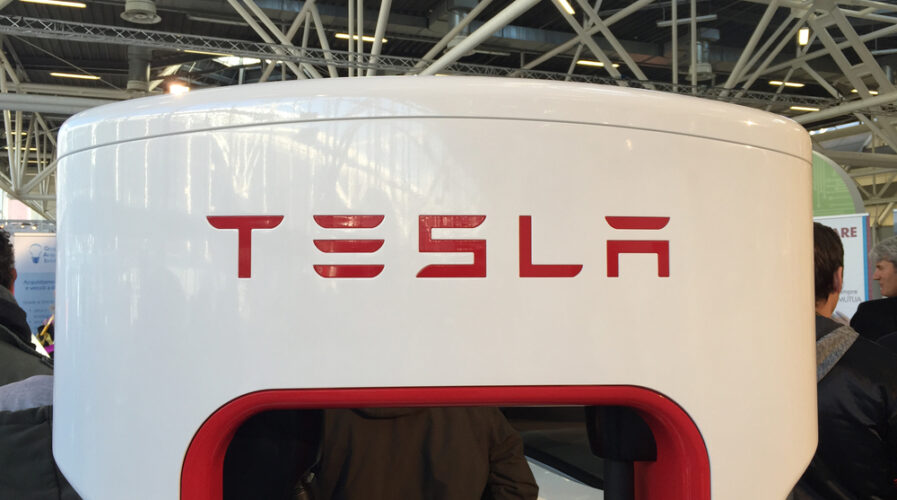
Tesla cars will finally be available in India, a country where electric vehicles have struggled to gain a foothold. Source: Shutterstock
Will Tesla in India help drive the country’s green goals?
- Tesla cars will finally be available in India, a country where electric vehicles have until recently struggled to gain a foothold
- Tesla’s operations will begin with sales in early 2021 and then “maybe” look at assembling and manufacturing vehicles in India
- Lack of infrastructure, high prices, and limited choices are some of the reasons why Indians aren’t too enthused to buy personal EVs
India, the second-most populated market in the world, may at long last introduce Tesla electric cars to its automobile market by early. If one were to take the words of India’s transport minister Nitin Gadkari and Tesla’s CEO Elon Musk’s tweets at face value, then the electric vehicle (EV) and clean energy company are expected to begin with sales in early next year.
Better yet, Tesla “may” look at assembling and manufacturing vehicles in the country, Nitin told Indian Express. How soon? Not next month for sure, according to Musk’s tweet over the weekend. Now, the question is, will this move turn the page for India’s electric vehicle revolution story?
Inevitably, the future is electric. Sooner or later, oil-run cars are going to become passe and we’ll have, arguably, environment-friendly, less-noisy electric vehicles take over the roads. But is India ready for the necessary arrangements to embrace the electric future just yet?
Currently, the automakers operating in India are Maruti Suzuki, Hyundai, steel giant Tata, and Mahindra Motors. In the past two years, Tata Motors, Hyundai, Morris Garages, and Mercedes have launched new electric car models in the country, including the Mercedes EQC and Tata Nexon EV.
Tesla’s India interest
This is not the first time that Tesla has tried to enter India.
For years, Tesla has expressed interest in expanding to India but those plans were met with one hiccup after another. In a 2018 tweet, Musk shared that “some government regulations” in India had emerged as a roadblock. Even a handful of Indians paid the token amount of US$1,000 to pre-order the Model 3 in 2016. Musk later blamed local regulations for the delay in bringing the EVs to India at the time.
On top of that, Prime Minister Narendra Modi has also visited Tesla’s California facility in 2015. Additionally, in 2019, Tesla had shown interest in the Indian government’s plan to build large factories to make lithium-ion batteries.
Now, as reports claimed, the first Tesla EV to arrive in the country will be the Model 3, which will start at around US$74,800, according to the Economic Times. The report adds that Tesla may open up orders for the EV in January and start deliveries by June.
Is India Tesla-ready?
Earlier this year, a proposal drafted by Modi-backed think tank Niti Aayog said the country could slash its spendings on oil imports by as much as US$40 billion in the next 10 years if electric vehicles were to be widely adopted.
Over the last three years, India has proposed billions of dollars in incentives to car companies who switch to electric alternatives and accelerate innovation and manufacturing of batteries in a bid to reduce its spending on oil and curb air pollution. Even New Delhi, which has claimed to abolish more than 1,000 “archaic laws” in recent years, has previously acknowledged the pain points expressed by Musk.
On top of that, India also proposed that ride-hailing firms Uber and Ola convert 40% of their fleets in the country to electric by April 2026. It stated that the ride-hailing giants must convert 2.5% of their fleet of cars by 2021, 5% by 2022, and 10% by 2023.
That is not it, Ola then acquired Amsterdam-based Etergo earlier this year, and declared this month that it plans to invest about U$327 million to set up “the world’s largest scooter factory” in the Southern Indian state of Tamil Nadu, which it said will have an initial capacity to produce 2 million electric vehicles a year and be able to create 10,000 new jobs.
However, the issue with many big companies that makes the mistake of entering India with the sole purpose of wooing the potentially huge market, is overlooking the glaring infrastructural deficiencies of the country. Let’s be frank, Indians, and in fact anyone from any country, isn’t going to buy a product if it’s impractical for the country, no matter how technically superior a car offering is.
According to a Bloomberg report from October 2019, India sold only 8,000 electric cars in the past six years. China sells more than that in two days. Another factor to consider is, on average, an EV takes more than an hour to charge and covers a range of about 120-140 kilometers on a single charge.
This brings us to the elephant in the room — there is less than 500 electric vehicle charging stations in India when the current need has been pegged at around 2,600. This is the country that is striving to ensure that by 2030, 30% of the passenger vehicles sold in India are green, a goal that was ambitiously and delusionally set at 100% earlier.
The upside though is according to the latest reports, the government is considering installing 69,000 charging kiosks at petrol pumps across the country. In the 2019 budget, Finance Minister Nirmala Sitharaman had announced an income tax exemption for people who’d buy electric vehicles on loan. The government also brought down GST rates on electric vehicles from 12 to 5%. However, the tax rebate failed to boost demand and in 2019, only 1,309 electric car units were sold between April and November.
READ MORE
- Ethical AI: The renewed importance of safeguarding data and customer privacy in Generative AI applications
- How Japan balances AI-driven opportunities with cybersecurity needs
- Deploying SASE: Benchmarking your approach
- Insurance everywhere all at once: the digital transformation of the APAC insurance industry
- Google parent Alphabet eyes HubSpot: A potential acquisition shaping the future of CRM


